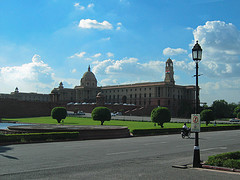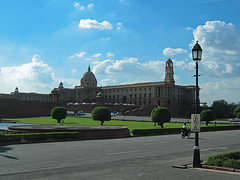
The Indian government is inching closer to pass a common goods and services tax (GST)
inance ministers from 15 states were meeting Thursday to discuss the next steps for a, a day after Parliament’s lower house, the Lok Sabha, passed the much-awaited legislation to introduce the proposed tax system.
The two-day meeting in Kerala is crucial as the government of Prime Minister Narendra Modi needs the support of opposition parties to get this landmark amendment to Constitution ratified by the Rajya Sabha and the state assemblies. The government plans to introduce GST from April 1, 2016.
Once adopted, a unified GST can dramatically alter tax administration in a one-shot solution by replacing a string of multi-layered central and local levies such as excise duties, value added tax and octroi into a single unified tax to lower commercial barriers that impede ease of doing business.
However, the ruling coalition of Prime Minister Narendra Modi is in a minority in the upper house of Parliament, the Rajya Sabha, which must endorse the bill with a two-thirds majority. Also, at least half of the state assemblies will have to ratify it before it finally becomes law.
The Congress party, which for years has been championing the need for replacing the layers of local and regional taxes that have caused red-tape, confusion and corruption with a single levy, led a walkout in the Lok Sabha, saying the rejigged bill of its 2011 version was not acceptable until it was examined by a parliamentary panel. The Left and some regional parties have also taken a similar position.
Analysts believe, both the Congress and the Left parties will unlikely vote against the bill, when it comes up for consideration in the Rajya Sabha. Also, the legislation found support from several small parties during the passage of the bill in the lower House. The bill was passed by 352 votes against 37 after the government rejected the opposition demand of referring it to a Standing Committee.
Replying to the debate on the bill in Lok Sabha on Wednesday, finance minister Arun Jaitley said the proposal to reform the indirect taxes has been pending for the last 12 years and his predecessor P Chidambaram also mooted it during UPA rule.
“A bill is not a dancing instrument that it will be jumping from Standing Committee to Standing Committee,” Jaitley said, he said referring to opposition demand to subject the bill to scrutiny of a parliamentary committee.
The key reform initiative has remained stuck for years due to lack of political consensus among states and the Centre and has faced political hurdles as states fear it will rob them of their fiscal powers.
Jaitley allayed states’ concerns that the new tax structure will trigger a drop in revenues for them, adding that it would lower inflation and promote growth in the long run. The bill offers a compensation package to states for potential revenue loss up to the first five years.
Ambiguous tax laws arfe often cited as one of the main reasons why large-scale private investors are wary of putting their money in India.





